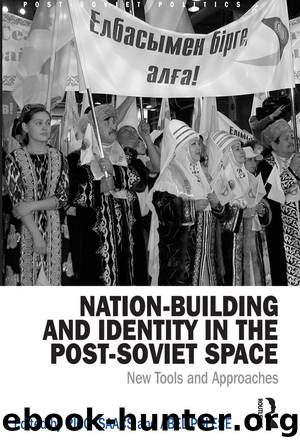Nation-Building and Identity in the Post-Soviet Space: New Tools and Approaches by Rico Isaacs & Abel Polese

Author:Rico Isaacs & Abel Polese [Isaacs, Rico & Polese, Abel]
Language: eng
Format: epub
Tags: Political Science, Comparative Politics, Political Ideologies, Nationalism & Patriotism
ISBN: 9780367281359
Google: 2Tz7CwAAQBAJ
Amazon: 036728135X
Publisher: Routledge
Published: 2016-04-14T03:06:52.707504+00:00
Legal Status and Definitions: Why They Matter
The relationship between language and political power is reflected not only on the structural level in Georgia (that is, the governmental structure of the state, including the Constitution or the various pieces of legislation produced by governing bodies); rather, one comes to see a definite disjunction between state rhetoric, legislation and the actual situation faced by Georgiaâs minority groups â in this case, ethnic Azeris â âon the ground.â While the Georgian state does broadly comply with international rules and regulations regarding minority rights, the extent of this compliance is limited, most often existing only as ink on paper. One important cause of the stateâs inability or failure to implement existing legislation regarding the protection of minority rights stems from the lack of specific legal definitions regarding minorities in Georgia.
A state must first produce official definitions of what constitutes a particular type of âminority,â which groups present on the countryâs territory fall under this or that definition, and which rights and responsibilities are afforded to which group before the state can enforce legislation concerning said minority groups. Such legal labels matter because they impact the nature of the relationship between the state (that is, a countryâs governing body) and the group in question. Whether or not a state considers a particular group of people to be more than a numerical minority often impacts the types of policies a state implements regarding treatment of non-titulars and the types of rights afforded them. Migrants, for example, as a type of minority, are often considered to be âguestsâ on a republicâs territory and are therefore faced with different sets of rights and responsibilities than, say, an indigenous group of people having lived on a particular territory prior to the drawing of contemporary state borders (de Varennes 1996: 311). A minority group made up of migrants from another territory is often expected to learn the titular language of the host state, for example, without immediately being afforded special language-related rights intended to promote the use of a non-titular language. That said, most states provide migrants or immigrants with tolerance-oriented language rights, meaning that individuals are free to use whichever language they prefer within the private sphere, but not necessarily within the public (or âadministrativeâ) sphere (Kymlicka and Patten 2003: 3â21, May 2011: 265â89). Georgiaâs ethnic Azeri population is not made up of immigrants, however, as the majority of Georgiaâs Azeris were born and raised in Georgia. Choosing the proper label for this group is necessary in order to mediate the relationship between this group and the Georgian state. This is necessary in order to ascertain the stateâs responsibilities with regard to its largest minority group, the Azeris.
If the state decides to acknowledge a particular group of people as a national minority, diaspora, or indigenous group, for example, then the state, based upon its own domestic laws as well as international agreements, de facto acknowledges its obligations and responsibilities with regard to the group in question. The types of
Download
This site does not store any files on its server. We only index and link to content provided by other sites. Please contact the content providers to delete copyright contents if any and email us, we'll remove relevant links or contents immediately.
| Africa | Americas |
| Arctic & Antarctica | Asia |
| Australia & Oceania | Europe |
| Middle East | Russia |
| United States | World |
| Ancient Civilizations | Military |
| Historical Study & Educational Resources |
Never by Ken Follett(2881)
The Man Who Died Twice by Richard Osman(2300)
Machine Learning at Scale with H2O by Gregory Keys | David Whiting(2291)
Fairy Tale by Stephen King(2070)
Will by Will Smith(2042)
Rationality by Steven Pinker(1765)
The Dawn of Everything: A New History of Humanity by David Graeber & David Wengrow(1571)
The Dark Hours by Michael Connelly(1570)
Principles for Dealing With the Changing World Order: Why Nations Succeed and Fail by Ray Dalio(1373)
Friends, Lovers, and the Big Terrible Thing by Matthew Perry(1328)
A Short History of War by Jeremy Black(1300)
HBR's 10 Must Reads 2022 by Harvard Business Review(1256)
Go Tell the Bees That I Am Gone by Diana Gabaldon(1234)
Can't Hurt Me: Master Your Mind and Defy the Odds - Clean Edition by David Goggins(1227)
515945210 by Unknown(1208)
Fear No Evil by James Patterson(1109)
443319537 by Unknown(1073)
Works by Richard Wright(1018)
Going There by Katie Couric(992)
